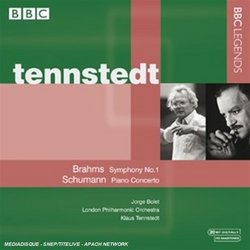| All Artists: Johannes Brahms, Robert Schumann, Klaus Tennstedt, London Philharmonic Orchestra, Jorge Bolet Title: Brahms: Symphony No. 1; Schumann: Piano Concerto Members Wishing: 0 Total Copies: 0 Label: BBC Legends Original Release Date: 1/1/2009 Re-Release Date: 2/24/2009 Genre: Classical Styles: Chamber Music, Forms & Genres, Concertos, Historical Periods, Classical (c.1770-1830), Symphonies Number of Discs: 1 SwapaCD Credits: 1 UPC: 684911425123 |
Search - Johannes Brahms, Robert Schumann, Klaus Tennstedt :: Brahms: Symphony No. 1; Schumann: Piano Concerto
 | Johannes Brahms, Robert Schumann, Klaus Tennstedt Brahms: Symphony No. 1; Schumann: Piano Concerto Genre: Classical |
Larger Image |
CD Details |
CD ReviewsA compelling Brahms First and good Schumann concerto from Te Santa Fe Listener | Santa Fe, NM USA | 03/04/2009 (5 out of 5 stars) "Even though it continues to attract little notice in the U.S., BBC Legends is doing the music world a great service by releasing a sizable legacy of Tennstedt's live performances. Many have been revelations, and almost all have been superior to his studio recordings of the same works. He only recorded a single Brahms symphony, the First, in 1983, and it caught him being flat-footed and conventional. If you want to hear Tennstedt's Brahms, pass that CD up and get this live one from 1990, despite some indifferent sonics. The conductor wasn't a fervent Brahmsian. There's no indication that he ever performed the Second Sym., and the Third apapeared on his programs only twice in twenty years (happily, BBC Legends has released one of those concert readings, a great one).
The First, however, was performed fifteen times, and if this concert is any indication, he could be masterful in this music. In an interview Tennstedt said that the problem was to balance symphonic weightiness and lyrical warmth, and he added that Brahms was overshadowed by the "trauma" of Beethoven. These remarks aren't exactly eye-opening, but Tennstedt's reading is thoroughly satisfying. Tempos and balances are traditional; what stands out is a flexible beat, spontaneous phrasing, and an animating spirit that keeps the line moving constantly. There are no lulls or hollow rhetoric. If your ideal of Brahms is rooted in Walter, Klemperer, and Giulini, this is a similarly warm, at times relaxed reading. The besetting problem with the studio recording was that after two convincing movements, the Shcerzo and finale are conventional and uninvolving. Here, the first two movements are again winning in their musicality -- the exposition repeat is missing in the first movement, by the way, since Tennstedt felt that it detracted from the impact of the development. As for the Scherzo, it's at the same tempo as the studio recording but feels animated and interesting; in character it's also brisker and lighter than what we get from ohter traditionalists. There's a building urgency that really appealed to me. The finale begins, as it should, with quiet tension and premonition. The long pizzicato section for strings could be more forceful, yet in compensation Tennstedt asks for explosive timpani intrjections, as he does in several other prominent places. The body of the finale is definitely more lyrical than heroic, until the end, when the driving timpani supports a broad climax. The LPO plays sweetly, but the original BBC radio tape is fairly dull, and Royal Festival Hall sounds flat and rahter dead acoustically. These sonic flaws don't detract in a major way from the listener's involvement, however. Give stars. Tennstedt avoided Schumann in the studio, so it's valuable to have a 1984 reading of the Piano Concerto with the emigre Cuban pianist Jorge Bolet, then seventy. Bolet, long a teacher at the Curtis Institute, gained a solo career quite late, and to be honest, his reserved, unimaginative style has never appealed to me. His rather heavy account of the solo part is flexible enough -- Bolet came from the old school as far as rubato is concerned -- but it sits oddly beside Tennstedt's fervent, outgoing accompaniment, which soars beyond anything Bolet is doing. Still, one would have been happy to encounter such a warm account in a subscription series. The sound is a shade closer and more vivid than in the Brahms, despite the fact that we are back in Royal Festival Hall again. Four stars." |
